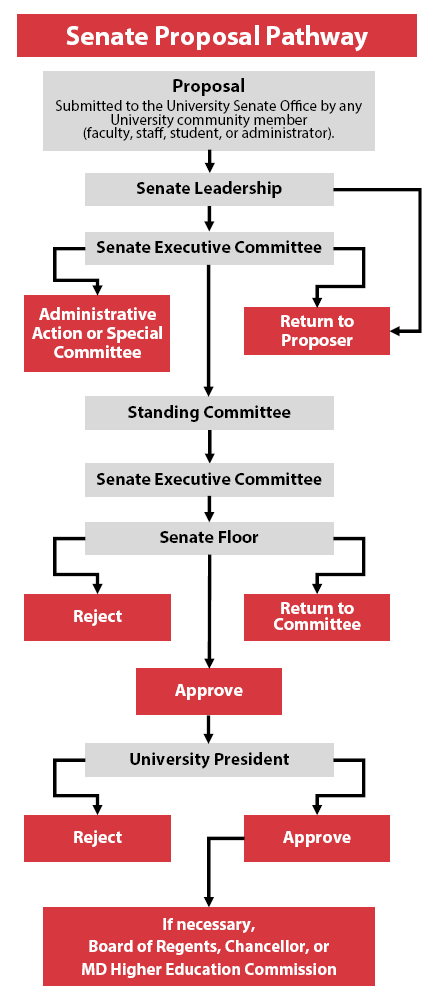Governance
In the 1970’s, the University of Maryland broadened the University Senate’s shared governance structure to include not only faculty, but staff, graduate students, and undergraduate students as well. This unique structure has facilitated increased communication across the University and has provided an opportunity for each constituency to have a voice and exercise leadership in decisions that help shape the University.
Faculty, staff, and student Senators are elected annually to fill vacancies on the University Senate. University Senate seats are apportioned by College and School for Faculty and Undergraduate students, by category for Staff (exempt and non-exempt categories), and at-large for Graduate students. Deans are ex-officio voting members of the Senate, and the President and Vice Presidents are non-voting ex-officio members. The apportionment of Senate seats is detailed in the University Plan of Organization.
Additionally, the University Senate is supported through a structured committee system (organizational chart below). The committees of the University Senate formulate and review policies to be established by the Senate, review established policies, and recommend any changes that may be desirable. Senators may nominate themselves for elected committees and non-Senators may nominate themselves for standing committees during the committee volunteer process, which takes place every spring.

Proposals for policy review can be submitted by any member of the University of Maryland campus. When a proposal is submitted to the University Senate Office, if the proposal is within the purview of the University Senate, it is first sent to be discussed in the Senate Executive Committee (SEC) and then typically sent to a standing committee as a charge. After a full review of the proposal and charge, the standing committee typically submits its report and recommendations to the SEC for placement on the agenda of the full Senate for debate, amendment, and approval.
Overall, participation is not just limited to Senators or those who participate in one of our many governing bodies. The University Senate serves all individuals at the University. All campus members are highly encouraged to actively engage with the University Senate and voice any concerns about policy or general University issues to their Senators, develop a proposal for policy review, or by participating on one of the University Senates governing bodies.
Every member on our campus deserves to have their voice heard. Our unique system of Shared Governance exists to support those voices in our campus community.
Please visit the following webpages below for more information:
To learn more about standing and elected committees of the University Senate please visit the committees webpages.
If you are a non-Senator looking to voice a concern to your Senator or to get involved, use the Find My Senator tool to get started or learn more about our Proposal process.
